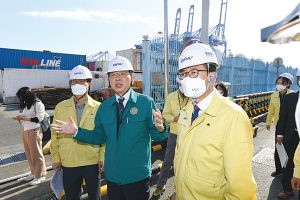Bloomberg
South Korea ordered striking cement truck drivers back to work in a dramatic step it said was necessary because of the threat to the nation’s economy.
The government issued the order during a cabinet meeting led by President Yoon Suk-yeol, and warned that violators will face legal action. This is the first time such a decree has been put in place on drivers since it was enacted under the Trucking Transport Business Act in 2004.
“I will firmly establish the rule of law between labour and management during my term,†Yoon said during the meeting. “I will never compromise with illegality, and the responsibility for illegal activities will be held strictly until the end.â€
The union criticised the order in a statement, saying it acts as “martial law,†and the group vowed to continue its protest. Talks between the union and transport ministry are scheduled to resume on Wednesday after the two sides failed to reach an agreement.
The strike, which began on November 24, has virtually suspended manufacturing and delivery of steel, cement and petroleum products. The number of containers moving in and out South Korea’s ports between 10 am and 5 pm fell 67% from normal levels, the transport ministry said.
The order for now is limited to truckers in the cement industry, as that sector has been hit hardest. Cement deliveries are down more than 90%, halting work at construction sites, Finance Minister Choo Kyung-ho said in a briefing.
This is the second major walkout by truck drivers this year, as the union demands that the government extend and expand a wage system guaranteeing minimum freight rates, citing surging fuel costs. The drivers are in a “disastrous situation†where they have to drive all night to bear the soaring cost of oil, putting their safety at risk, the union said in its statement.
The protests are the latest instance of labour actions across the world threatening to upend economies and global trade. Supply-chain workers are showing growing discontent from California to Bangladesh as food and energy costs soar following Russia’s invasion of Ukraine.
The Biden administration is moving to prevent a looming shutdown of the nation’s rail workers that could create major supply-chain disruptions just before Christmas. South Korea is also facing further turmoil amid widespread strikes in public transportation and other services across the country.
 The Gulf Time Newspaper One of the finest business newspapers in the UAE brought to you by our professional writers and editors.
The Gulf Time Newspaper One of the finest business newspapers in the UAE brought to you by our professional writers and editors.
